11 Home Remedies To Control Hair Fall | Symptoms & Treatments
Know the root cause of your hair loss and learn some easy ways to deal with it.
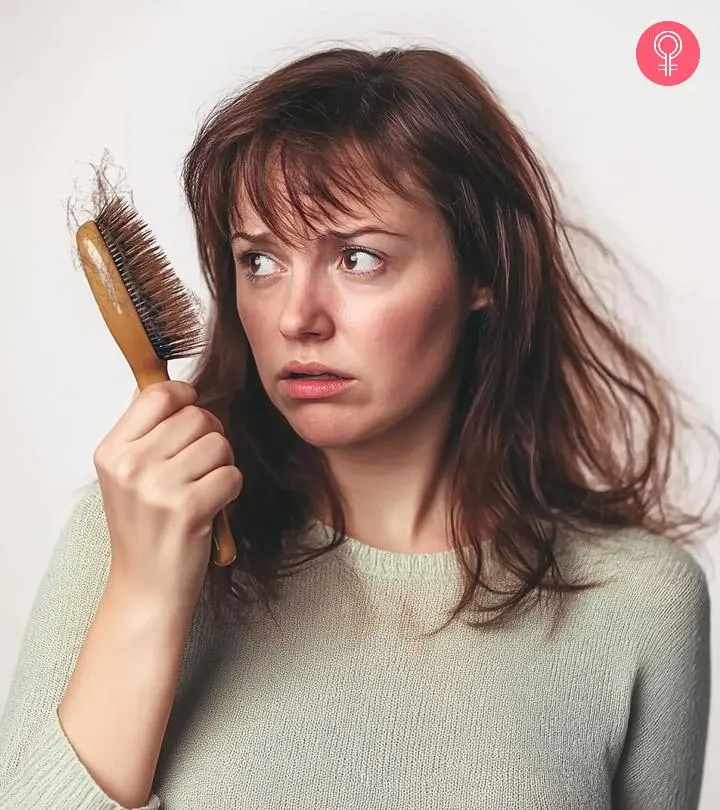
Image: Midjourney/ StyleCraze Design Team
As hair loss and thinning hair are becoming prevalent issues among many, several individuals are increasingly looking for tips to control hair fall.
Hair loss has become a common concern, whether due to genetics or the constant stress we have been subjecting our hair to (dyeing, styling, heat treating, etc.). But how do you get to the root of the problem? Is it safe to take supplements or chemical treatments, or should you try natural alternatives? Continue reading to learn more.
In This Article
What Causes Hair Fall?
is common, but when it happens continuously and uncontrollably, it may feel like the end of the world. When your hair falls excessively from your scalp, it can cause baldness. While hair loss mainly affects the scalp health in many people, it may also affect the entire body for a few people.
Dr. Michael May, a hair transplant surgeon, says, “Some common reasons for hair fall are medication-induced hair loss and lifestyle changes. Medication-induced hair loss is a side effect of a medication or treatment, such as hormone treatments and chemotherapy. Lifestyle factors, such as stress and diet, are common causes of hair thinning. For example, an extremely stressful lifestyle or sudden stressful situations can have a short- or long-term effect on hair growth rate. Likewise, crash dieting or a diet with low protein levels and lacking nutrients will make it difficult for the body to maintain healthy hair follicles and grow healthy and strong hair strands.”
Factors that could be held responsible for triggering hair loss are:
- A family history of hair loss that is commonly referred to as male-pattern or female-pattern baldness
- Hormonal changes due to childbirth, pregnancy, thyroid problems, and menopause
- Medical conditions like alopecia areata, ringworm, and hair pulling disorder
- Medications used to treat cancer, arthritis, heart problems, high blood pressure, and gout
- Radiation therapy
- Certain hairstyles that include tying your hair too tight
- Heat styling that includes permanent straightening, blow drying, and curling
- Lack of proper nutrition
Some factors may also increase your risk of losing hair. They are:
- Advancing age
- High levels of stress
- Significant weight loss
- Conditions like diabetes and lupusi An inflammatory autoimmune disorder caused when the immune system attacks healthy tissues and causes pain, fatigue, rash, and fever.
Key Takeaways
- Hormonal issues and genetics to poor diet may cause hair fall.
- You can control your hair fall with the help of medications as well as hair transplant procedures.
- Deficiency in vitamins H, D, and E may cause hair loss.
- Coconut oil, yogurt, and fenugreek may help manage hair fall
- Always handle your hair gently and avoid harsh hair products to prevent hair fall.
Infographic: Tips To Control Hair Fall
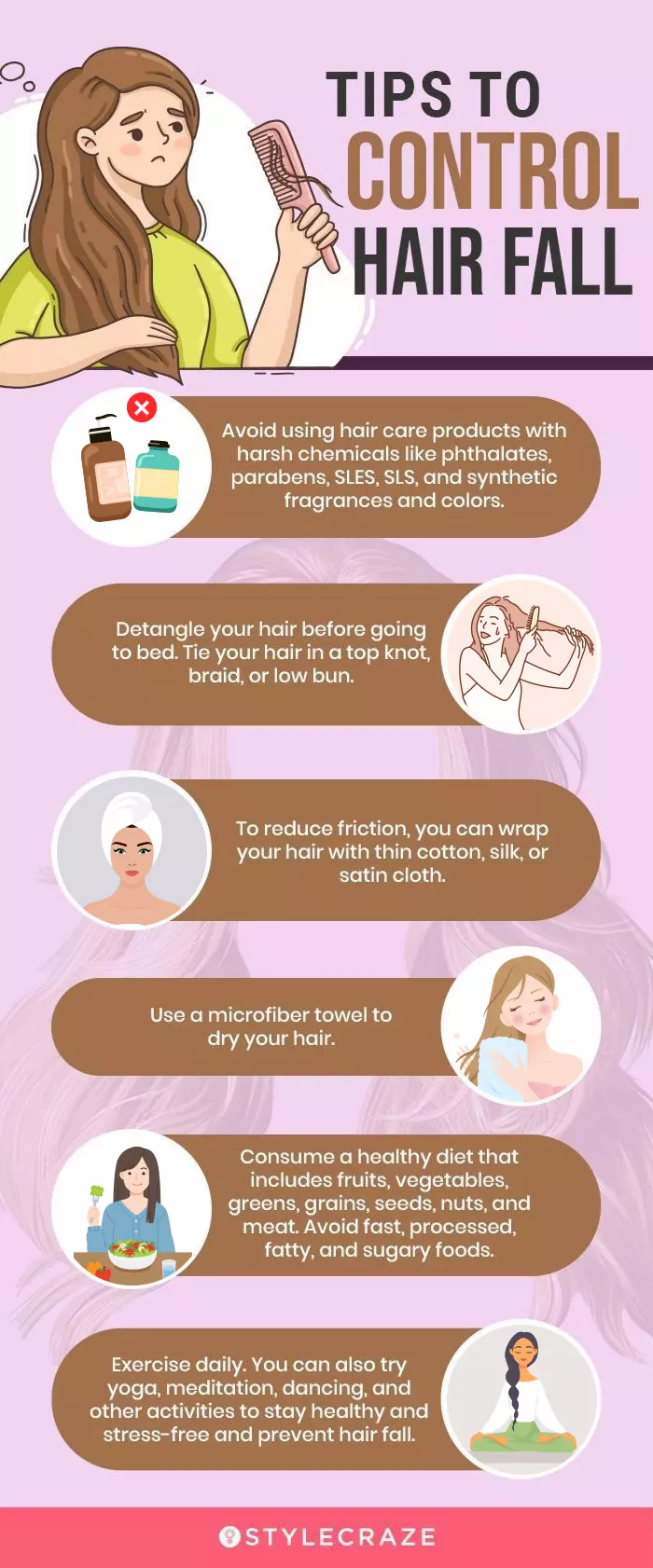
Illustration: StyleCraze Design Team
 Trivia
TriviaA study was conducted on 45,000 participants with the average age estimated at 43 years. The study found the prevalence of alopecia areata to be 0.21% overall, 0.12% for mild, and 0.09% for moderate to severe alopecia areata.
Those affected by hair loss usually show one or more of the following signs and symptoms.
Signs And Symptoms
The symptoms of hair loss may include:
- Gradual thinning of hair on top of the head
- Circular or patchy bald spots
- Loosening of hair
- Hair loss in the entire body
- Scaly patches on the scalp
 Trivia
TriviaThese symptoms may vary from one individual to another, depending on the underlying cause. It is best to see your doctor immediately if you notice any of the above symptoms.
How To Test Hair Fall
Your doctor may suggest one or more of the following tests to find out the cause of your condition:
- Blood test
- Pull test that includes pulling several strands of your hair by the doctor to determine the stage of the shedding process.
- Scalp biopsy, where the sample from your scalp or hair plucked from the scalp is tested.
- Light microscopy to examine hairs that are trimmed at their bases.
Once the cause of your hair loss is determined, you can discuss the hair treatment options with your doctor. If you are wondering how to control hair fall, the following section might help you out.
What Are The Available Treatments For Hair Loss?
Now the question is, how to stop hair fall! Thankfully there are many ways to put a stop to it. Treatment for hair loss may include:
- Medications like minoxidil (Rogaine) that is approved for both men and women, finasteride (Propecia) for men, and other drugs like spironolactone and oral contraceptives for women.
- Hair transplant surgery or restoration surgery that includes taking skin patches with multiple hair follicles and implanting them onto bald patches.
- Laser therapy to improve hair density.
While these treatments may help you deal with hair loss, there is a high chance of recurrence if the cause is hereditary. Also, most of the medications used to treat hair loss come with side effects like reduced libido, scalp irritation, and an increased risk of prostate cancer in men. The other treatment methods like hair transplant surgery and laser therapy may be heavy on your pocket and may have side effects like scarring.
Hence, instead of investing your time and money in such treatments, if you have mild hair fall, it is better to opt for natural alternatives that are completely safe for your scalp and skin.
If you are looking at how to reduce hair fall at home, some simple yet effective natural solutions might save the day. Listed below are some excellent home remedies for hair growth and hair care that are proven to help with hair fall.
11 Home Remedies To Control Hair Fall
1. Vitamins
One of the best ways to stop your hair fall is to take vitamins for hair fall control. Deficiencies in vitamins H, D, and E are associated with hair loss. Restoring such deficiencies by supplementing these hair vitamins may help restore hair growth
(1). Thus, intake of these crucial nutrients may act as an effective hair fall treatment at home. However, remember that over supplementation of these vitamins, as well as vitamin A, can cause severe side effects like alopecia.
2. Coconut Oil
Coconut oil is one of the best home remedies for hair fall. It can penetrate deep into your hair shafts and prevent protein loss.
This helps reduce hair damage and breakage often caused by physical trauma like harmful hair styling techniques and the use of harsh products (2).
You Will Need
1-2 tablespoons of virgin coconut oil
What You Have To Do
- Massage virgin coconut oil gently into your scalp and hair.
- Leave it on for at least an hour before rinsing it off with a mild cleanser.
- Follow up with a conditioner.
How Often You Should Do This
You may do this at least two times a week.
Read: How to stop Hair Fall
3. Amla (Indian Gooseberry)
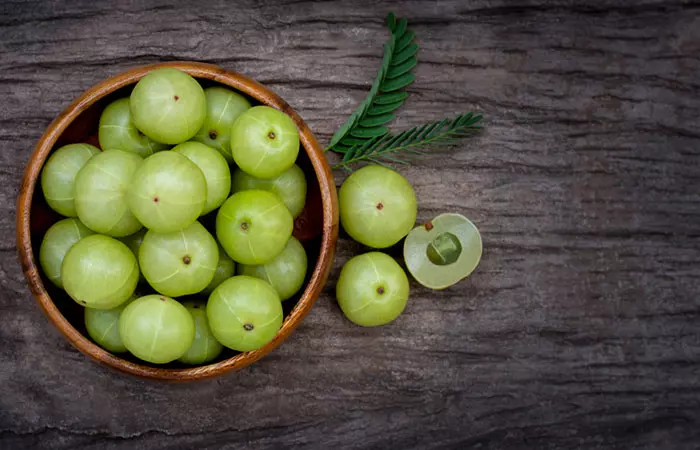
Amla (Emblica officinalis) is a traditional natural Indian hair fall solution at home. It exhibits hair growth promoting activity. It has a proliferative effect on the dermal papilla cellsi The cells located near the skin surface, at the bottom of the hair follicles, that help improve the hair growth cycle. in the hair follicles (3).
You Will Need
Fresh amla juice (as required)
What You Have To Do
- Apply fresh amla juice to your scalp. Leave it on for 30 minutes.
- Rinse it off using a mild cleanser.
- Follow up with a conditioner.
How Often You Should Do This
You may do this 1-2 times a week.
4. Yogurt
Yogurt is a rich source of probiotics, which are known to lead to an acidic pH. An acidic pH can alter your hair cuticles, giving you a shinier mane and preventing damage that may trigger hair breakage and loss (4).
You Will Need
A bowl of probiotic-rich yogurt
What You Have To Do
Consume a bowl of probiotic yogurt.
How Often You Should Do This
You can consume this once daily for best results.
5. Methi (Fenugreek)
There are some Herbs for hair growth that are great for fighting hair fall problems. Fenugreek (Trigonella foenumgraecum) is one of them. It possesses hair growth promoting properties. It not only reduces hair loss significantly but also stimulates new hair growth (5).
You Will Need
- ½ cup of fenugreek seeds
- Water
What You Have To Do
- Soak half a cup of fenugreek seeds in water overnight.
- Grind the soaked paste and apply it as one of the hair masks.
- Leave it on for 30-60 minutes and rinse it off with water.
How Often You Should Do This
You may do this once a week.
6. Onion Juice
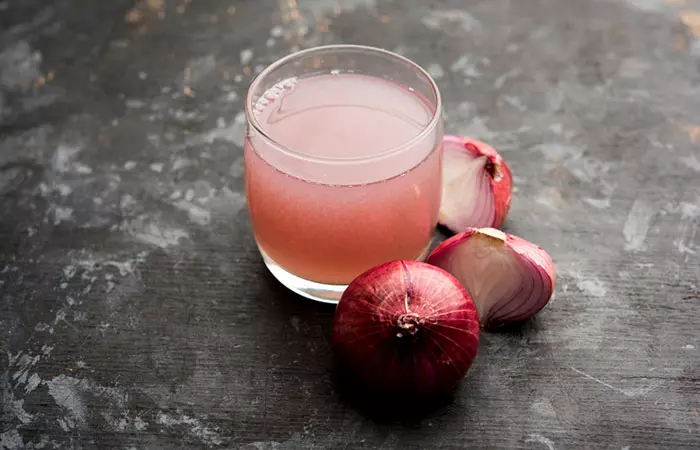
This is one of the most effective hair fall home remedies. According to a study published in the Journal of Dermatology, the topical application of crude onion juice to the scalp can aid hair regrowth, especially in cases of alopecia areata (6).
You Will Need
½ onion
What You Have To Do
- Blend the onion and strain the mixture to obtain the juice.
- Apply the juice to your scalp and leave it on for 30-60 minutes.
- Rinse it off with water.
How Often You Should Do This
You may do this 1-2 times a week.
7. Chinese Hibiscus
The leaves and flowers of Chinese hibiscus (Hibiscus rosa-sinensis) show hair growth promoting activities and can be used to deal with hair loss (7).
You Will Need
- 1-2 hibiscus flowers
- 5-6 hibiscus leaves
- Coconut oil (as required)
What You Have To Do
- Blend the hibiscus flowers and leaves.
- Add a little coconut oil to this mixture.
- Apply it to your scalp and spread some to your hair.
- Leave it on for 30-60 minutes.
- Rinse it off with a mild shampoo and condition your hair.
How Often You Should Do This
You may do this once a week.
8. Green Tea

Green tea contains a polyphenoli A naturally occurring micronutrient that has antioxidant and anti-inflammatory properties that promote hair growth. called epigallocatechin-3-gallate (EGCG). EGCG stimulates the growth of the dermal papilla cells of the scalp and can help in the prevention as well as treatment of androgenetic alopeciai A permanent, genetic hair loss condition that affects the top and crown of the head in both men and women. (8).
You Will Need
- 1 green tea bag
- 1 cup of hot water
What You Have To Do
- Put a green tea bag in a cup of hot water.
- Steep for 5-10 minutes and strain.
- Allow the solution to cool a bit.
- Drink the tea.
How Often You Should Do This
You may drink this 1-2 times daily.
9. Egg Yolk Mask
The water-soluble peptides in egg yolk possess hair growth stimulating properties that may be useful to treat hair loss (9).
You Will Need
1 egg yolk
What You Have To Do
- Whisk the egg yolk.
- Apply it to your scalp and leave it on for at least 30 minutes.
- Rinse it off using a fragrant shampoo and follow up with a conditioner.
How Often You Should Do This
You may do this once a week.
10. Henna
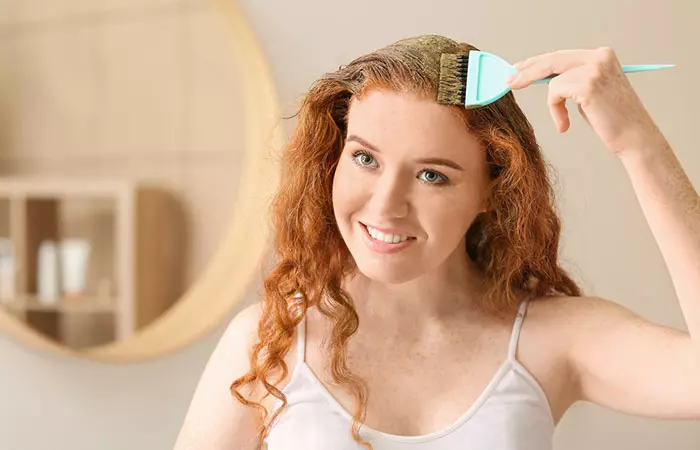
Henna can help with hair regrowth when applied topically. It works almost as well as minoxidil (a drug used to treat hair loss) in treating hair fall caused by telogen effluviumi A temporary hair loss condition caused by a traumatic event or a stressful experience a person undergoes. (10).
You Will Need
- 1 cup of henna leaves
- Water (as required)
What You Have To Do
- Blend the henna leaves with water to form a thick paste.
- Apply the paste to your scalp and spread the remaining mixture through the length of your hair. Leave it on for an hour.
- Rinse it off with water.
- You may use any organic henna powder if fresh leaves aren’t available.
How Often You Should Do This
You may do this once in a week.
11. Curry Leaves
Curry leaves help in retaining the natural pigmentation of your hair while also stimulating hair growth (11).
You Will Need
- A handful of curry leaves
- ½ cup of coconut oil
What You Have To Do
- Add a handful of curry leaves to half a cup of coconut oil and heat it in a saucepan.
- Once the mixture reduces to a black residue, switch off the stove and allow the oil to cool.
- Strain the oil to remove the leaves from the mixture.
- Apply the oil to your scalp and spread it through your hair. Leave it on for 30-60 minutes.
- Rinse it off with a mild shampoo.
- Follow up with a conditioner.
How Often You Should Do This
You may do this once every week.
All these remedies can help reduce hair fall and may also reverse it if you follow them diligently. Remember, these remedies will take time to show results, so patience and consistency are key. In addition to the above remedies, here are some dietary changes that may help reduce hair fall and damage.
Dietary Changes For Healthy Hair
- Eating leafy greens like spinach and kale can boost hair health due to their rich iron and vitamin content (1).
- Nuts, such as almonds and walnuts, provide healthy fats and biotin, which help strengthen hair (12).
- Seeds like flaxseeds and chia seeds are packed with omega-3 fatty acids, promoting shiny and healthy hair (13) (14).
- Including eggs in your diet may help improve hair growth as they are rich in protein and vitamins (9).
- Adding berries like strawberries and blueberries gives your hair an antioxidant boost, protecting it from damage (15) (1).
Including these dietary changes may help improve your hair and reduce hair loss. However, it is always best to prevent it than treating. Therefore, let us look at a few prevention tips also.
How To Prevent Hair Fall
According to Dr. May, “Drinking enough water daily significantly impacts your hair health, reducing the chances of hair falling out.” He states that one must drink at least two to three liters of water daily for proper hydration.
He adds, “Drinking water ensures better hair health. For healthy hair maintenance, you need to keep your body properly hydrated. Washing your hair with water won’t hydrate it. Instead, drink enough water each day. Dehydration causes dry, brittle hair, so drink lots of water to keep your hair full and healthy.”
Here are some suggestions you can follow to prevent hair fall:
- Avoid tying your hair tight.
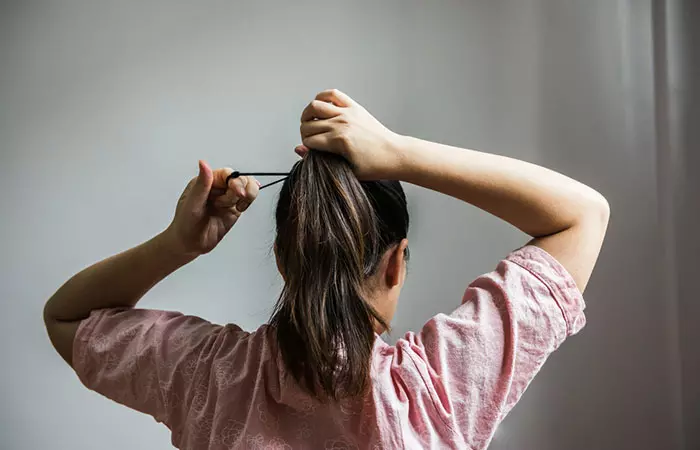
Image: Shutterstock - Do not twist, rub, or pull your hair.
- Handle your hair gently while combing and washing.
- Avoid using harsh treatments on your hair like curling irons, hot oil treatments, or hot rollers.
- Stop taking medications or supplements that could be contributing to hair fall.
- Protect your hair from the damaging sun rays by using hats and scarves when you step out.
- Nourish your hair with regular scalp massages.
- Practice stress management to restore hormone balance and to prevent premature hair greying and hair loss.
- Quit smoking.
- Ask your doctor for a cooling cap if you are undergoing chemotherapy.
Elle Anne, a hair care blogger, recounted how she embraced androgenetic alopecia. After several experiments with haircuts and stylings, she resorted to a wig and regained her confidence. She writes, “The confidence this gave me was overwhelming! I was suddenly welcoming of having my photo taken, of going to gatherings, of letting my hair down at the beach. It was truly freeing. I finally felt like me again (i)!”
However, it is a fact that hair loss can have a significant psychological impact. Continue reading to learn more about it.
Understanding The Emotional Impact Of Hair Loss
Understanding the psychological impact of hair loss is important because it can deeply affect how people feel about themselves. Hair loss can lead to significant anxiety about how others see you and worry about your appearance, which often extends to social situations. Many people feel less confident and less attractive when they lose hair, which can hurt their self-esteem and self-worth. The emotional toll can also contribute to feelings of sadness and depression, affecting overall mental health and daily life. Some might start avoiding social activities or gatherings because they feel embarrassed about their appearance. The ongoing concern about hair loss can also add to stress levels, impacting both mental and physical health. Recognizing these effects can help in seeking support and managing the emotional challenges of hair loss.
However, with the right knowledge about hair loss, it can be managed and reduced to some extent. For example, some types of hair loss can actually be reversed. Yes, you read that correctly! Let us explore how you can address and potentially improve hair loss.
Can Hair Loss Be Reversed?
It depends on certain factors. Some hair loss conditions can be reversed, while others are irreversible. However, it depends on what is causing it. Here are some points to consider:
- Genetic hair loss conditions such as androgenetic alopecia are inherited and may not be reversible. They can also be too challenging to prevent.
- Hair loss caused by diet, lifestyle, hormonal imbalance, etc., can be reversed by making changes to address the concerns.
- Hair loss caused by underlying medical issues may be reduced by treating the condition. Discontinuing certain medicines may help reverse drug-induced hair loss.
- Certain treatments such as hair transplants, topical medications, laser therapy, PRP therapy, etc., can help manage severe hair fall conditions.
Genetics, hormonal changes, certain medications, medical conditions, excessive styling, natural aging, stress, and nutritional deficiencies may cause or trigger hair loss. After testing your hair to find out the root cause of your hair fall, your physician may recommend medications, laser therapy, or hair transplant surgery. You may also opt for a more natural approach and use home remedies to control hair fall. Coconut oil, Indian gooseberry, fenugreek seeds, green tea, henna, and curry leaves are among the most effective ingredients you can use to reduce hair fall by inducing hormonal balance. In addition, follow hair fall tips and avoid tying your hair too tightly or styling it excessively, be gentle with your hair, especially when it is wet, take vitamin hair supplements and protect it from sun damage and to ensure proper hair nourishment.
Frequently Asked Questions
Does cutting hair short reduce hair fall?
No, cutting your hair short will not reduce hair fall. Your hair feels thicker right after a haircut as it is thicker at the base.
Does having long hair make your hair fall out?
No, having long hair does not cause it to fall out unless you are always pulling and tugging at your hair.
How can I stop my hair from falling out due to medications?
If you notice that a certain medication is causing your hair to fall out more, stop taking it immediately and discuss the possible alternatives with your doctor.
What should we eat to stop hair fall?
Fatty fish rich in omega-3 like salmon, mackerel, and herring can help promote hair growth (16). Citric fruits like oranges, lemons, grapefruit, and berries can also help with hair fall due to their high vitamin C content (17).
Why does hair fall in winter?
Your hair falls more during winters because the air is dry. The dry climate tends to suck out all the moisture from your scalp. A dry scalp causes your hair to become dry as well, thus increasing the chances of hair breakage and hair fall. The heating system installed inside homes during winters can further aggravate the damage done to your hair, thus causing it to fall more.
Is milk good for the hair?
Yes. Milk is packed with proteins and vitamins that are good for hair strengthening and help support healthy, thick hair (18).
Does flaxseed reduce hair fall?
Possibly. Flaxseed is rich in omega-3 fatty acids and vitamins that may promote hair growth (19), (20).
Is eating rice good for hair?
There is a lack of scientific evidence that suggests eating rice boosts hair health or growth.
Illustration: Home Remedies To Control Hair Fall | Symptoms & Treatments
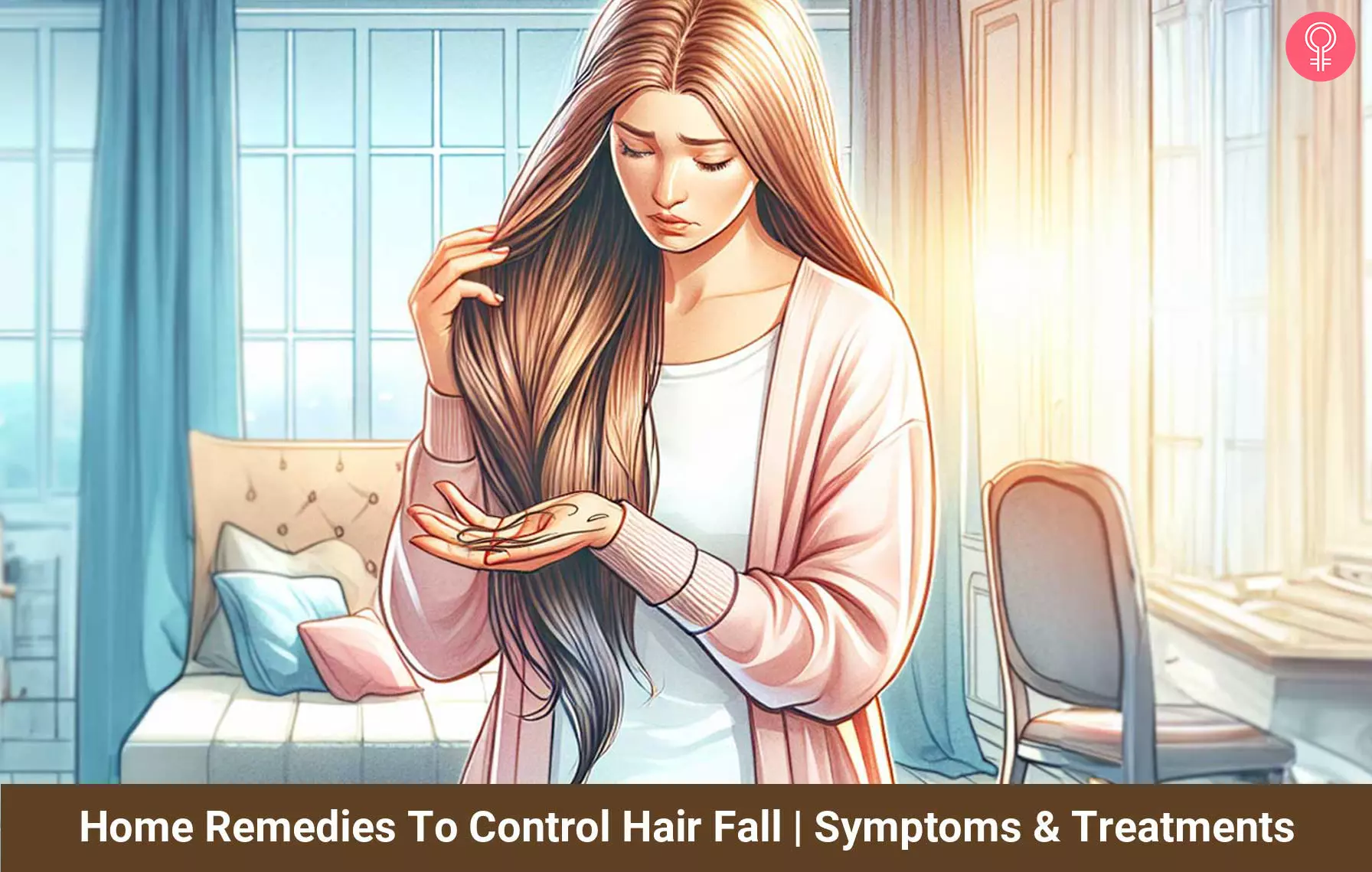
Image: Dall·E/StyleCraze Design Team
Learn 5 tips to stop hair loss and regrow your hair naturally. Get the best advice from an expert and start your journey to healthier hair today!
Personal Experience: Source
StyleCraze's articles are interwoven with authentic personal narratives that provide depth and resonance to our content. Below are the sources of the personal accounts referenced in this article.
i. Elle’s Hair Loss Storyhttps://elleshaircorner.wordpress.com/2020/07/20/elleshairstory/
References
Articles on StyleCraze are backed by verified information from peer-reviewed and academic research papers, reputed organizations, research institutions, and medical associations to ensure accuracy and relevance. Read our editorial policy to learn more.
- “Diet and hair loss: effects of nutrient deficiency and supplement use” Dermatology Practical & Conceptual, US National Library Of Medicine.
- “Effect of mineral oil, sunflower oil, and coconut oil on prevention of hair damage.” Journal of Cosmetic Science, US National Library Of Medicine.
- “Emblica (Phyllanthus emblica Linn.) Fruit Extract Promotes Proliferation in Dermal Papilla Cells of Human Hair Follicle” Research Journal Of Medicinal Plants, Science Alert.
- “Probiotic Bacteria Induce a ‘Glow of Health’” PLoS One, US National Library Of Medicine.
- “In vivo Hair Growth Activity of Herbal Formulations” International Journal Of Pharmacology, Science Alert.
- “Onion juice (Allium cepa L.), a new topical treatment for alopecia areata.” Journal Of Dermatology, US National Library Of Medicine.
- “In vivo and in vitro evaluation of hair growth potential of Hibiscus rosa-sinensis Linn.” Journal of Ethnopharmacology, US National Library Of Medicine.
- “The effects of tea polyphenolic compounds on hair loss among rodents.” Journal Of The National Medical Association, US National Library Of Medicine.
- “Naturally Occurring Hair Growth Peptide: Water-Soluble Chicken Egg Yolk Peptides Stimulate Hair Growth Through Induction of Vascular Endothelial Growth Factor Production.” Journal of Medicinal Food, US National Library Of Medicine.
- “Comparison of the efficacy of topical lawsonia inermis and topical minoxidil in the treatment of telogen effluvium” Natural Products, Trade Science Inc.
- “An update on Murraya koenigii Spreng: a multifunctional Ayurvedic herb” Journal Of Integrative Medicine.
- “A Review of the Use of Biotin for Hair Loss” Skin Appendage Disorders, US National Library Of Medicine.
- “Chia Seeds (Salvia Hispanica L.): An Overview—Phytochemical Profile, Isolation Methods, and Application” Molecules, US National Library Of Medicine.
- “The Role of Flaxseed in Improving Human Health”, Healthcare, US National Library Of Medicine.
- “Survey of antioxidant capacity and phenolic composition of blueberry, blackberry, and strawberry in Nanjing”, Journal of Zhejiang University. Science. B, US National Library Of Medicine.
- “Mackerel-Derived Fermented Fish Oil Promotes Hair Growth by Anagen-Stimulating Pathways” International Journal of Molecular Sciences, US National Library Of Medicine.
- “The Role of Vitamins and Minerals in Hair Loss: A Review” Dermatology And Therapy, US National Library Of Medicine.
- “Milk Proteins—Their Biological Activities and Use in Cosmetics and Dermatology” Molecules, US National Library Of Medicine.
- “The cardiovascular effects of flaxseed and its omega-3 fatty acid, alpha-linolenic acid” The Canadian Journal Of Cardiology, US National Library Of Medicine.
- “Effect of a nutritional supplement on hair loss in women” Journal of Cosmetic Dermatology, US National Library Of Medicine.
Read full bio of Vd. Naveen Sharma
- Dr. Michael May, MD, is the Medical Director and Principal Surgeon of the Wimpole Clinic in Harley Street, London. He has 25 years of experience in the field of hair transplant surgery and has completed over 10,000 hair transplant procedures. He is the current president of the European Society of Hair Restoration Surgery, a registered member of The Trichological Society, and a Diplomat of Hair Restoration Surgery (ABHRS).
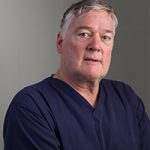 Dr. Michael May, MD, is the Medical Director and Principal Surgeon of the Wimpole Clinic in Harley Street, London. He has 25 years of experience in the field of hair transplant surgery and has completed over 10,000 hair transplant procedures. He is the current president of the European Society of Hair Restoration Surgery, a registered member of The Trichological Society, and a Diplomat of Hair Restoration Surgery (ABHRS).
Dr. Michael May, MD, is the Medical Director and Principal Surgeon of the Wimpole Clinic in Harley Street, London. He has 25 years of experience in the field of hair transplant surgery and has completed over 10,000 hair transplant procedures. He is the current president of the European Society of Hair Restoration Surgery, a registered member of The Trichological Society, and a Diplomat of Hair Restoration Surgery (ABHRS).
Read full bio of Shaheen Naser
Read full bio of Anjali Sayee
Read full bio of Swathi E






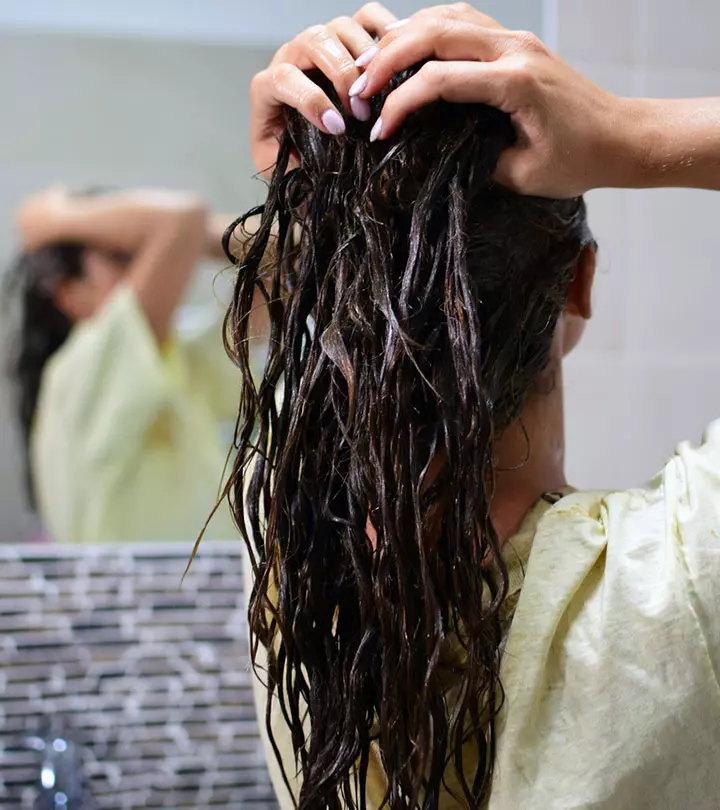

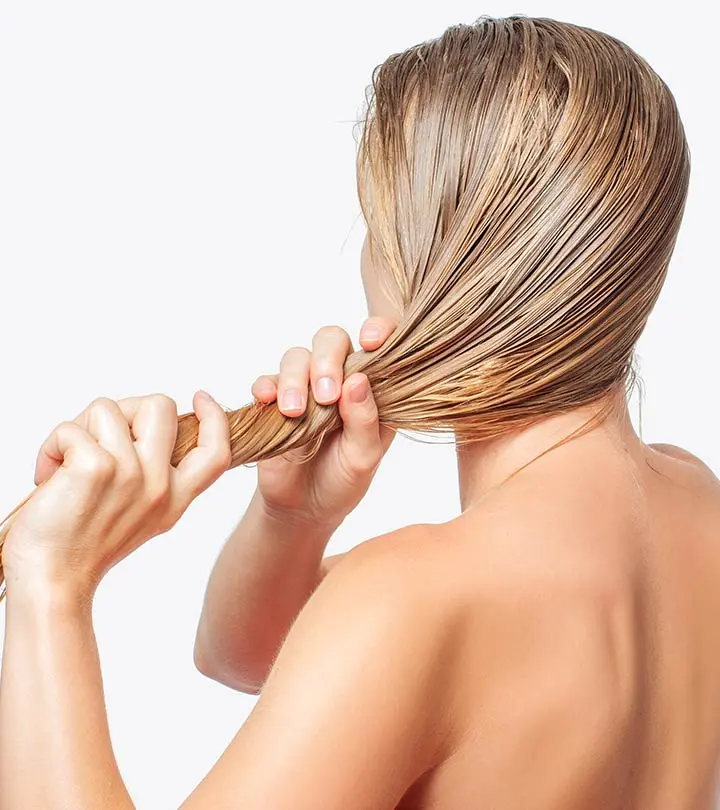
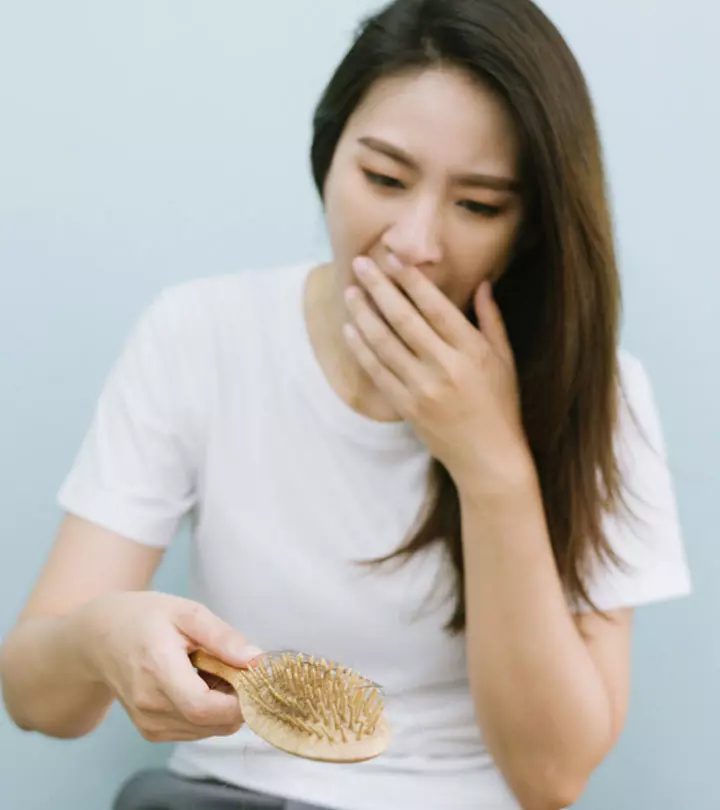
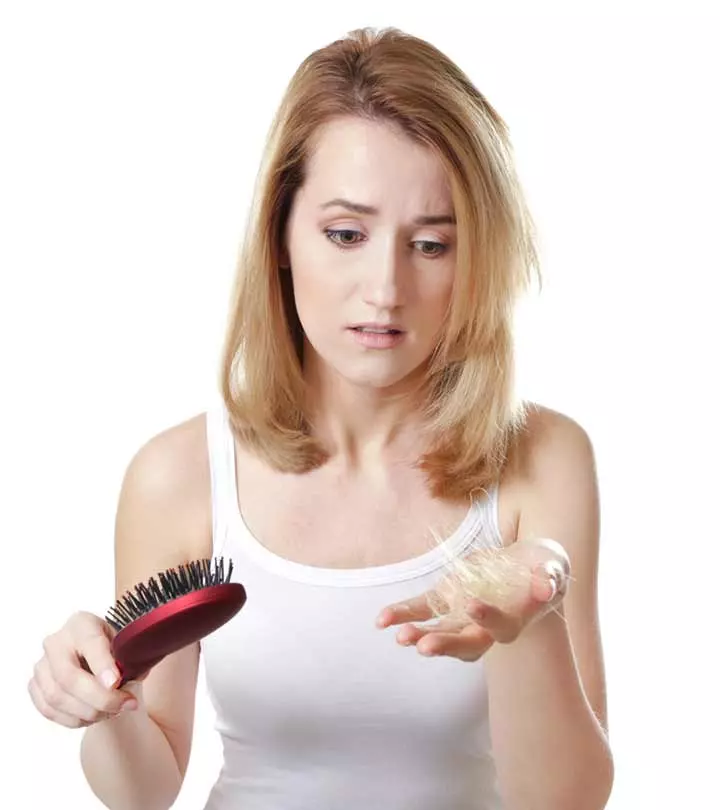
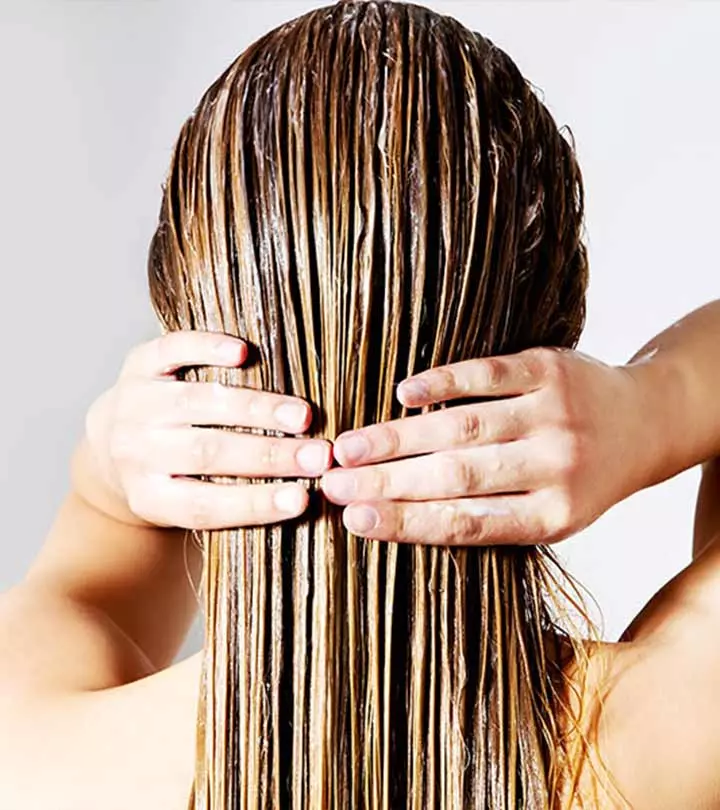
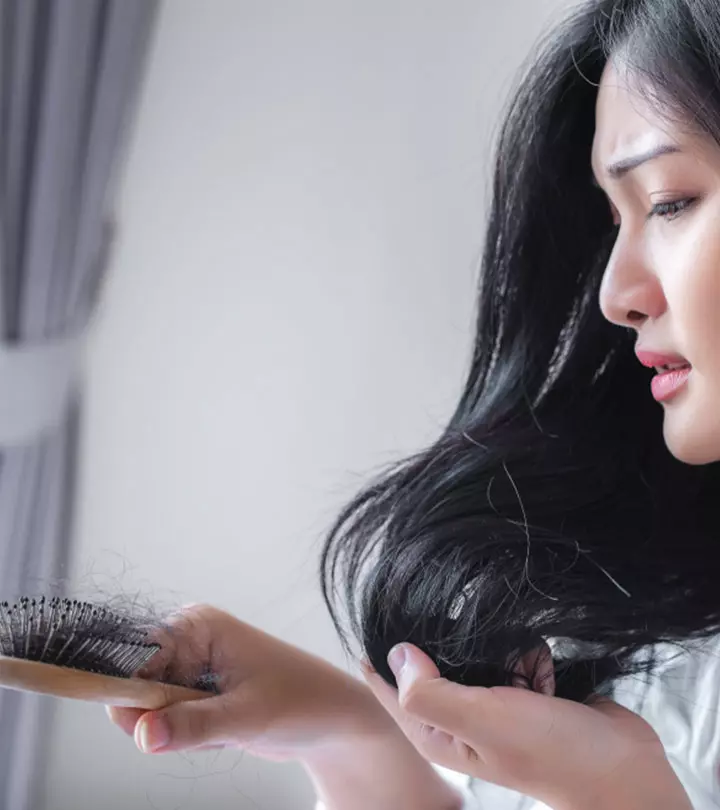
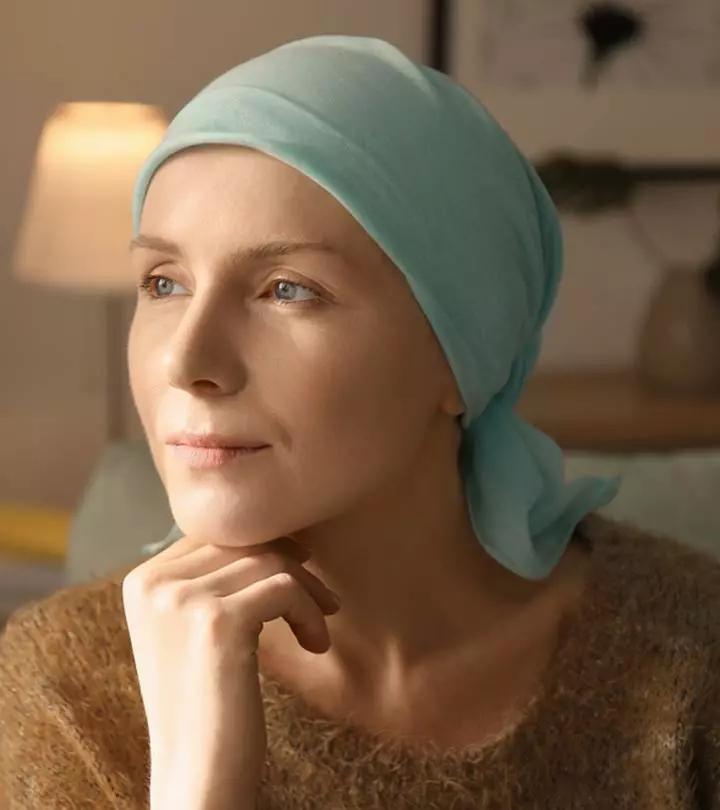
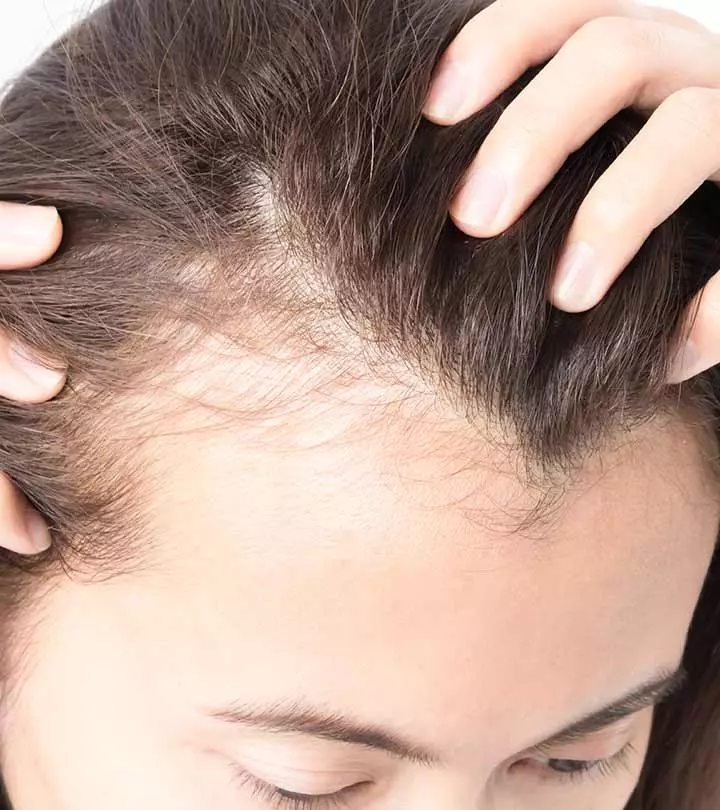
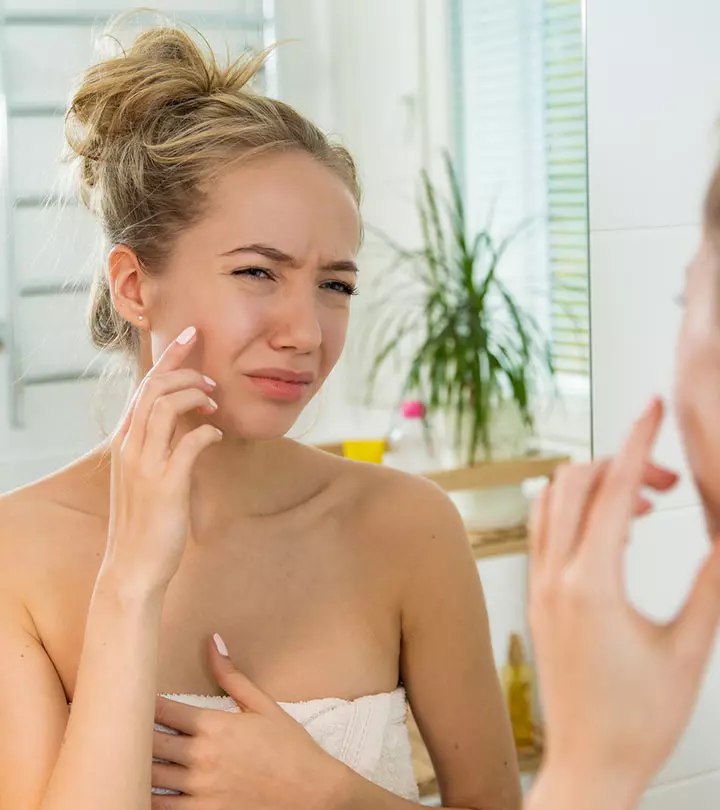
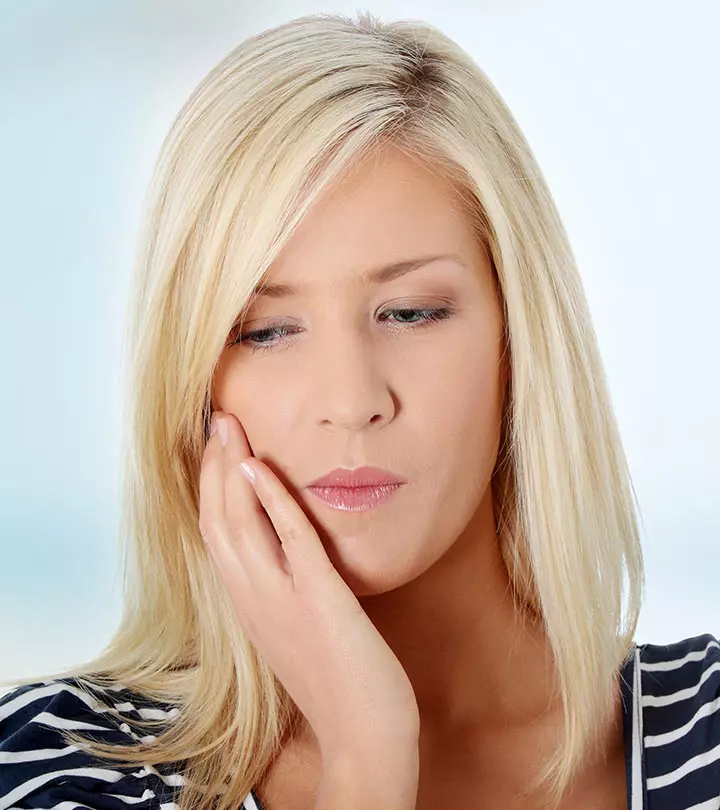
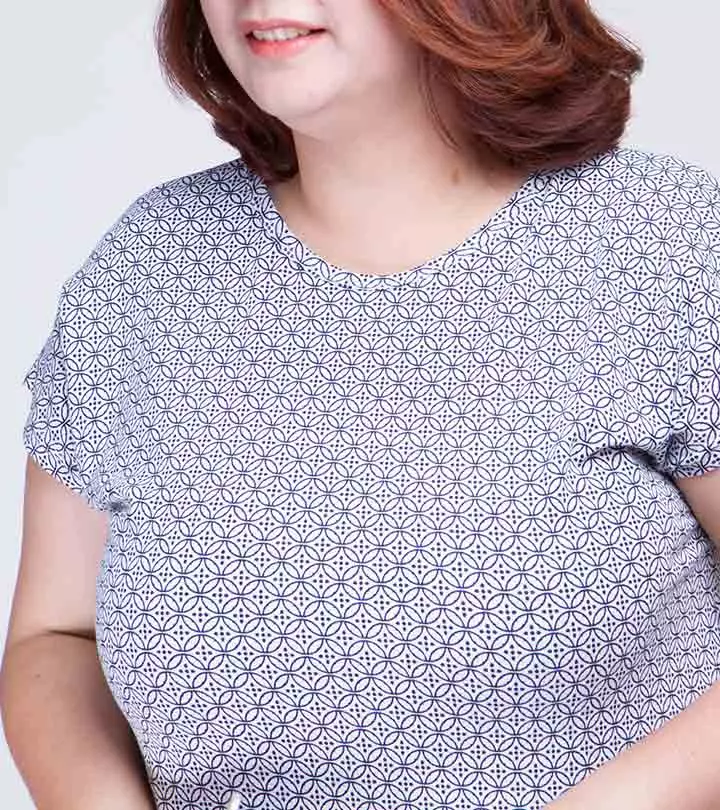
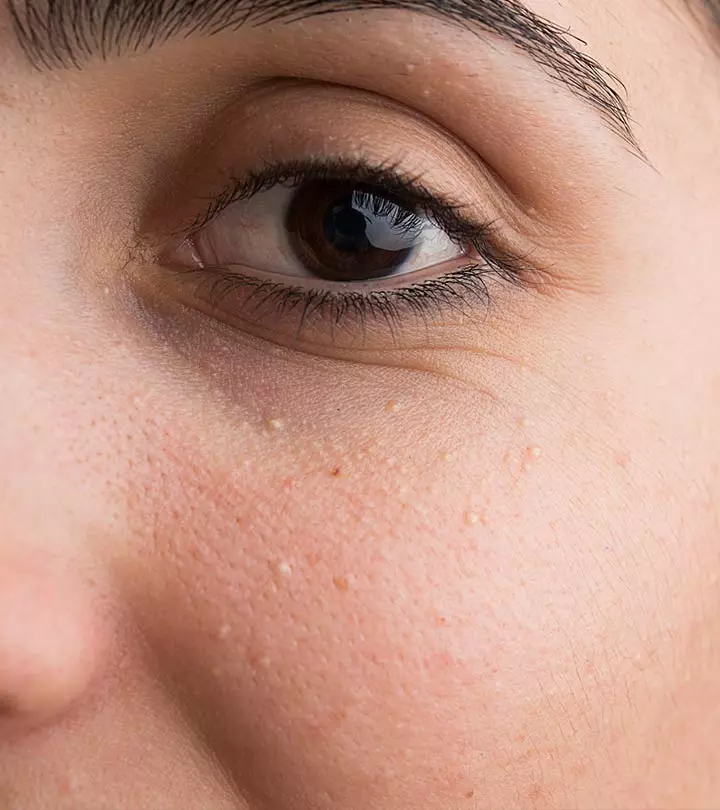
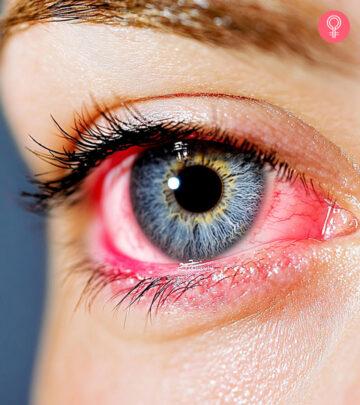
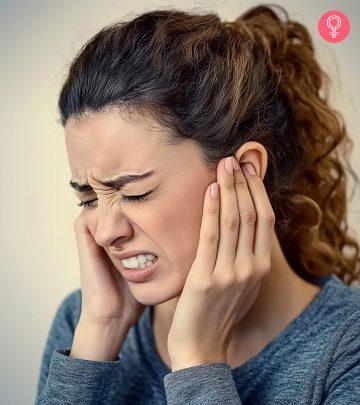
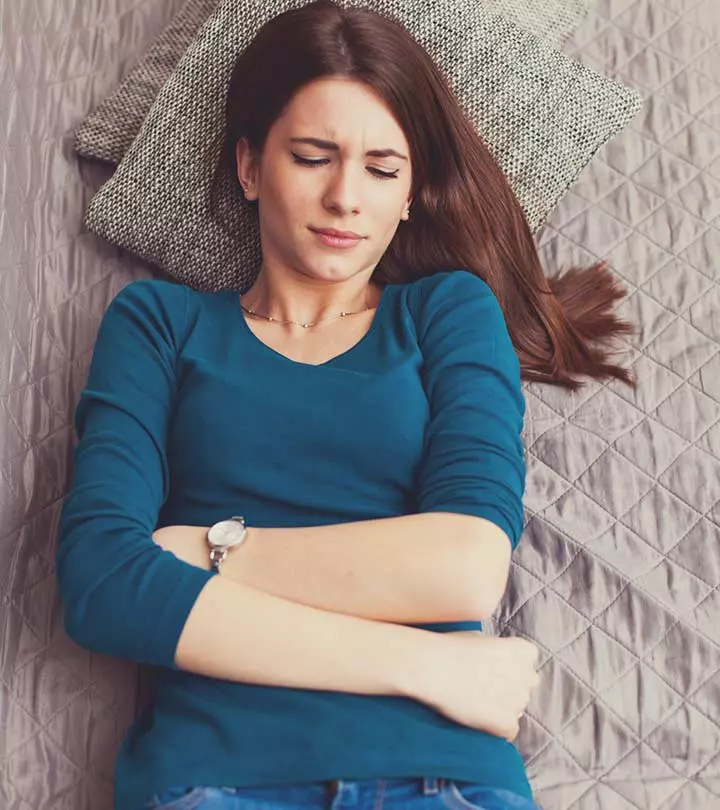
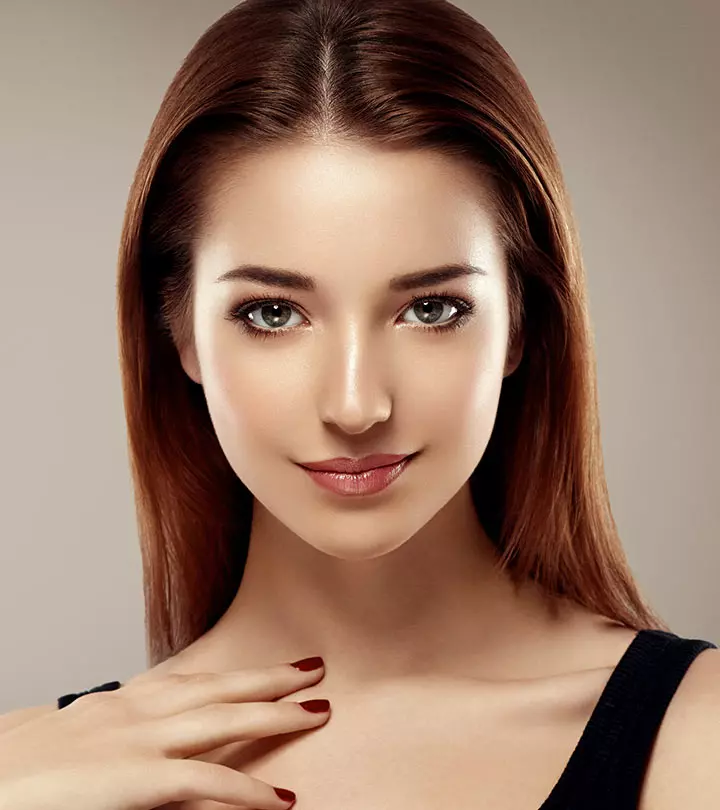
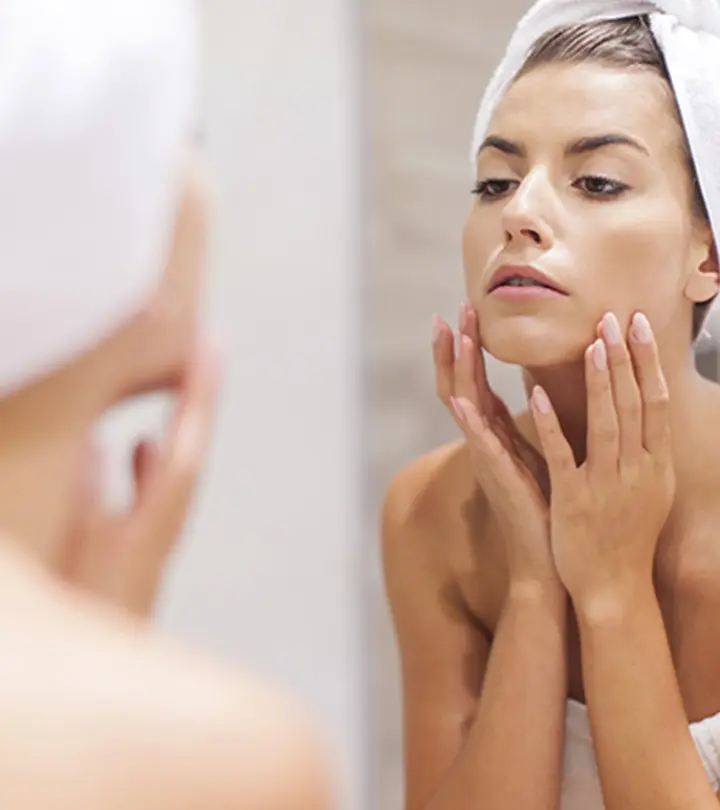
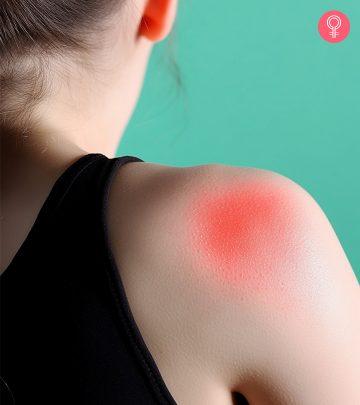
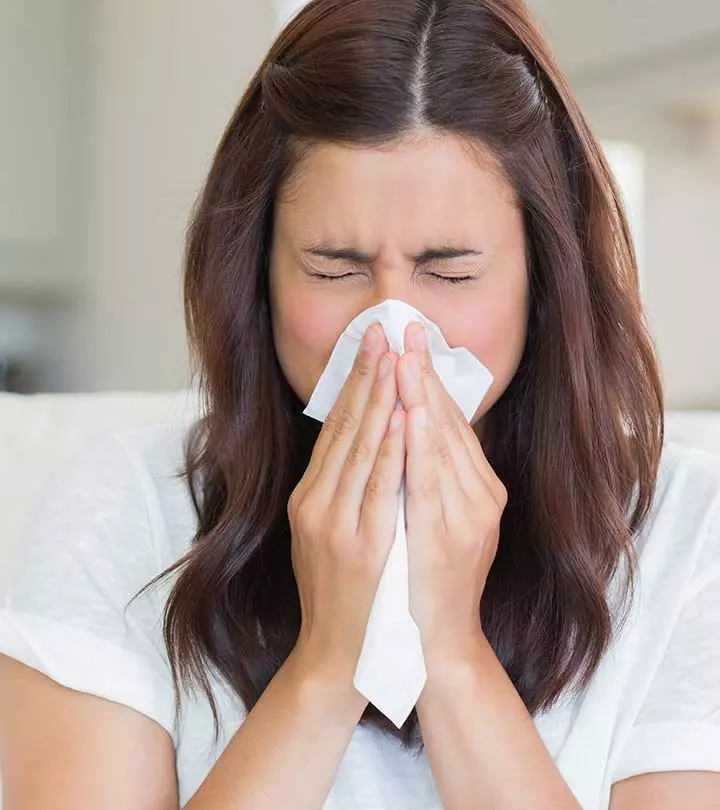
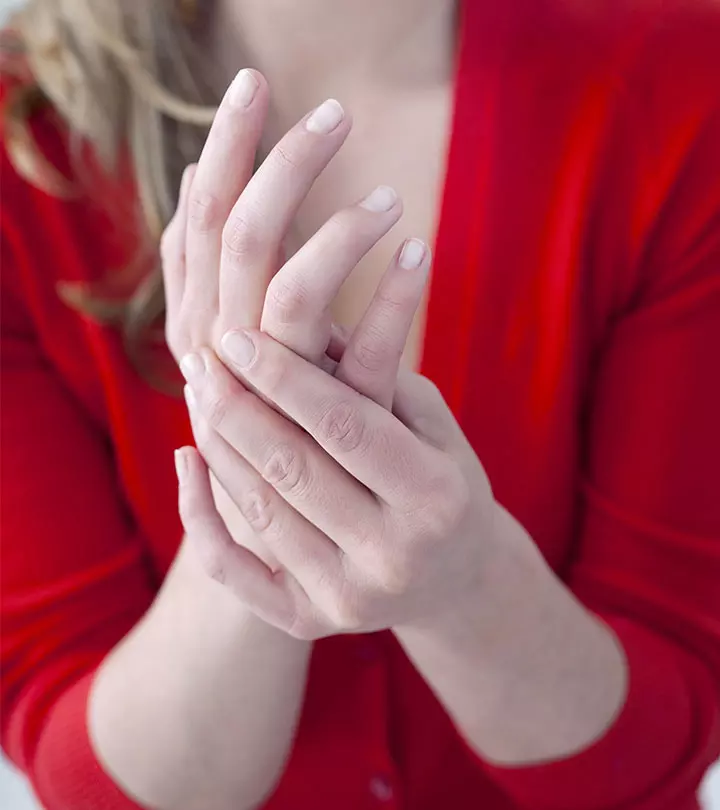
Community Experiences
Join the conversation and become a part of our empowering community! Share your stories, experiences, and insights to connect with other beauty, lifestyle, and health enthusiasts.